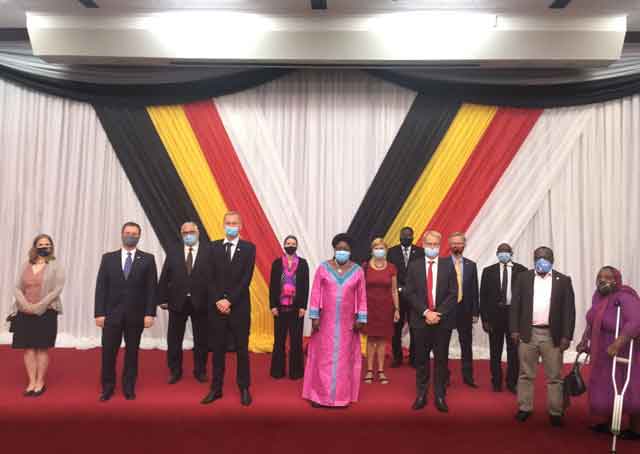
Kampala, Uganda | THE INDEPENDENT | Ambassadors in Uganda have said Uganda has failed to make improvements when it comes to elections processes despite continued recommendations from observers and the Judiciary.
The Ambassadors under their organisation, the Partners Development Group (PDG) comprising representatives from the European Union (EU), the United States of America (USA), United Kingdom, South Korea, Norway, Iceland, Japan, International Monetary Fund (IMF), World Bank and the United Nations (UN) were today holding a meeting with the Speaker of Parliament Rebecca Kadaga.
The group which has also held meetings with political parties, the Electoral Commission and the media to discuss challenges and prospects for the 2021 elections observed that although there have been several recommendations in as far as elections are concerned, little or no effort has been made to improve the electoral process.
In their final report after the 2016 polls, the European Union Elections Observer Mission made 30 recommendations that needed to be given priority to improve Uganda’s elections. They include granting the Electoral Commission sole regulatory power to regulate essential parts of the electoral process, including voter registration, polling, tallying and electoral dispute system prior and during the election.
The mission also called for the amendment of the legal framework to allow all citizens who reach 18 years of age by the day of the election to vote and strengthening the EC’s integrity by engaging civil society in the selection process and subjecting proposed candidates to public scrutiny.
The mission also requested that steps be taken to differentiate the state from the ruling party in an electoral context, and putting in place an effective sanctioning mechanism against the misuse of state resources, including administrative and security apparatus, during the election period.
But Rudi Veestraten, the Belgian Ambassador to Uganda and South Sudan says that although the European Union (EU) had its observers in Uganda monitoring elections and made suggestions to the government, in the past, the government has not heeded to the advice. He says that even though elections are nowhere perfect worldwide, it can be improved, an issue that Uganda is not paying attention to.
Veestraten points out that although the constitution gives every Ugandan above 18 years, the right to vote, in the practice, the electoral laws do not grant the Ugandans these rights and youths need to be 19 years to vote. He adds that the number of teenagers who turn 18 after the registration process or before the voting day is so huge and cannot be left out.
Veestraten adds that the government has failed to improve the level playing field for the candidates ranging from money accessed by those in power and opposition and access to the media.
The Ambassadors also expressed their concern over the continued violence in elections, starting from the National Resistance Movement (NRM) primary elections. Austrian Embassy Charge de Affairs, Roswitha Kremser said that instances of violence seen in NRM elections are a detrimental factor for especially women in elections.
Nikolaj A. Hejberg Petersen the leader of the team and the Ambassador Embassy of Denmark says that when it comes to enforcement of COVID-19 guidelines, it has in many cases been used to victimize certain groups while when it comes to others it is not enforced. He says the meeting agreed that indeed there should be a levelled playing field and enforcement of guidelines should be equal.
Kadaga said that sometimes, the enforcement of the Standard Operating Procedures have been applied differently, and she believes that since Uganda is practising multiparty politics, there is a need to allow the opposition to campaign freely.
She adds that Parliament did its best to ensure that there are reforms ahead of the next election cycle but adds that parliament does not have the powers to move bills that will have an impact on the consolidated fund.
Jacob Oboth Oboth, the chairperson Legal and Parliamentary Affairs committee who attended the meeting raised concern about loopholes in the independence of the electoral commission.
********
URN
 The Independent Uganda: You get the Truth we Pay the Price
The Independent Uganda: You get the Truth we Pay the Price


